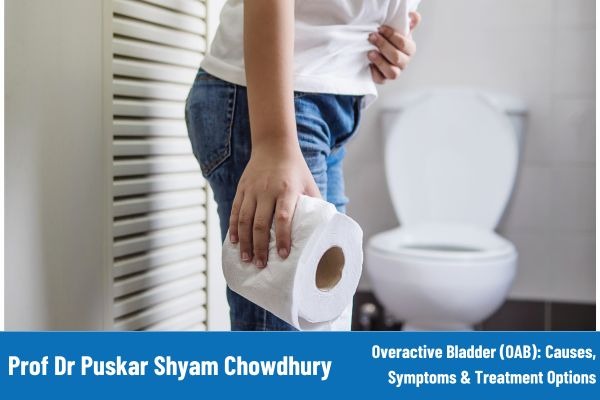Overactive Bladder (OAB): Causes, Symptoms & Treatment Options
Learn about Overactive Bladder (OAB), its causes, symptoms, and treatment options. Discover lifestyle changes, medications, and therapies to manage OAB effectively.
Prof Dr Puskar Shyam Chowdhury
4/5/20252 min read


Overactive Bladder (OAB): Causes, Symptoms & Treatment Options
Expert Insights from Dr. Puskar Shyam Chowdhury
Do you experience a sudden, strong urge to urinate that disrupts your daily routine? You’re not alone. Overactive Bladder (OAB) affects millions of people, leading to frequent urination, urgency, and even urinary incontinence. While OAB can be embarrassing and frustrating, effective treatments are available.
Dr. Puskar Shyam Chowdhury, a leading urologist, explains the causes, symptoms, and treatment options for Overactive Bladder to help you regain control of your life.
What is Overactive Bladder (OAB)?
Overactive Bladder is a condition where the bladder muscles contract involuntarily, causing a strong urge to urinate even when the bladder isn't full. It often leads to frequent urination, nighttime urination (nocturia), and urgency incontinence (urine leakage before reaching the bathroom).
What Causes Overactive Bladder?
OAB can occur due to several reasons, including:
✔ Neurological disorders – Stroke, Parkinson’s disease, or multiple sclerosis can affect bladder control.
✔ Aging – Bladder muscles weaken over time, leading to urgency and frequent urination.
✔ Urinary tract infections (UTIs) – Can cause bladder irritation and urgency.
✔ Bladder obstructions – Enlarged prostate (in men) or bladder stones may contribute to OAB.
✔ Hormonal changes – Menopause can cause bladder dysfunction in women.
✔ Excess caffeine or alcohol intake – These irritants can worsen symptoms.
Common Symptoms of Overactive Bladder
People with OAB typically experience:
🔹 Frequent urination – More than 8 times a day
🔹 Urgency – Sudden and uncontrollable need to urinate
🔹 Nocturia – Waking up multiple times at night to urinate
🔹 Urge incontinence – Leaking urine before reaching the restroom
How is Overactive Bladder Diagnosed?
Dr. Puskar Shyam Chowdhury may recommend:
🔍 Urinalysis – To rule out infections or kidney issues
🔍 Bladder diary – Tracking fluid intake and urination patterns
🔍 Urodynamic tests – To assess bladder function and pressure
🔍 Post-void residual test – To check how well the bladder empties
Effective Treatment Options for OAB
Managing Overactive Bladder involves a combination of lifestyle changes, medications, and medical procedures.
1. Lifestyle Modifications
🟢 Bladder Training: Gradually increase the time between urinations to strengthen bladder control.
🟢 Pelvic Floor Exercises (Kegels): Strengthens the muscles that control urination.
🟢 Dietary Changes: Avoid caffeine, alcohol, spicy foods, and artificial sweeteners.
🟢 Weight Management: Excess weight can put pressure on the bladder, worsening symptoms.
🟢 Hydration Balance: Drinking adequate water while avoiding excessive fluid intake before bedtime.
2. Medications for OAB
Dr. Puskar Shyam Chowdhury may prescribe medications to relax bladder muscles, such as:
💊 Anticholinergics (Oxybutynin, Tolterodine) – Reduce bladder contractions.
💊 Beta-3 Agonists (Mirabegron) – Help the bladder store more urine.
3. Advanced Therapies & Procedures
For severe OAB cases, additional treatments include:
⚡ Botox Injections – Temporarily relax bladder muscles to reduce urgency and leakage.
⚡ Nerve Stimulation (PTNS or SNS) – Electrical stimulation to regulate bladder function.
⚡ Bladder Surgery – In rare cases, bladder augmentation or diversion surgery may be required.
When Should You See a Doctor?
If OAB symptoms are disrupting your daily life, affecting sleep, or causing embarrassment, it’s time to consult an expert. Early treatment can prevent complications and improve your quality of life.
Why Choose Dr. Puskar Shyam Chowdhury for OAB Treatment?
✔ Experienced Urologist – Specializing in bladder dysfunction and urinary disorders.
✔ Personalized Treatment Plans – Tailored to individual needs and severity of symptoms.
✔ Advanced Therapies – Expertise in minimally invasive and surgical treatments for OAB.
Final Thoughts
Overactive Bladder is manageable with the right approach. If you’re experiencing frequent urination, urgency, or leakage, don’t hesitate to seek medical help. Dr. Puskar Shyam Chowdhury offers expert diagnosis and treatment to help you regain control and confidence.
Take the first step towards better bladder health – Book your consultation today!